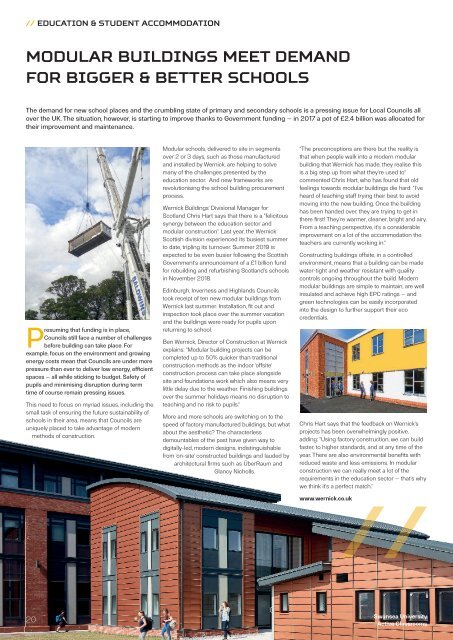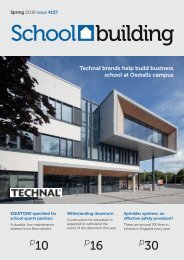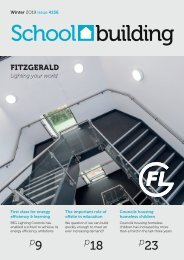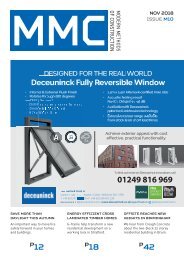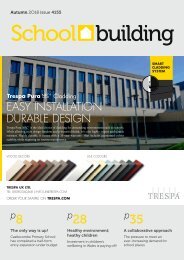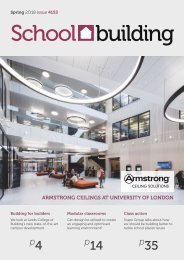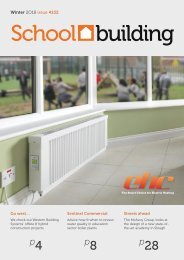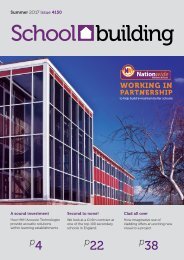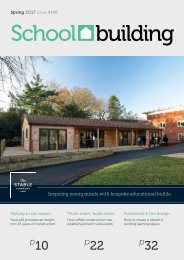a.aa MMC M11 52pp Web
You also want an ePaper? Increase the reach of your titles
YUMPU automatically turns print PDFs into web optimized ePapers that Google loves.
Education & Student Accommodation<br />
Modular Buildings Meet Demand<br />
for Bigger & Better Schools<br />
The demand for new school places and the crumbling state of primary and secondary schools is a pressing issue for Local Councils all<br />
over the UK. The situation, however, is starting to improve thanks to Government funding – in 2017 a pot of £2.4 billion was allocated for<br />
their improvement and maintenance.<br />
Presuming that funding is in place,<br />
Councils still face a number of challenges<br />
before building can take place. For<br />
example, focus on the environment and growing<br />
energy costs mean that Councils are under more<br />
pressure than ever to deliver low energy, efficient<br />
spaces – all while sticking to budget. Safety of<br />
pupils and minimising disruption during term<br />
time of course remain pressing issues.<br />
This need to focus on myriad issues, including the<br />
small task of ensuring the future sustainability of<br />
schools in their area, means that Councils are<br />
uniquely placed to take advantage of modern<br />
methods of construction.<br />
Modular schools, delivered to site in segments<br />
over 2 or 3 days, such as those manufactured<br />
and installed by Wernick, are helping to solve<br />
many of the challenges presented by the<br />
education sector. And new frameworks are<br />
revolutionising the school building procurement<br />
process.<br />
Wernick Buildings’ Divisional Manager for<br />
Scotland Chris Hart says that there is a “felicitous<br />
synergy between the education sector and<br />
modular construction”. Last year, the Wernick<br />
Scottish division experienced its busiest summer<br />
to date, tripling its turnover. Summer 2019 is<br />
expected to be even busier following the Scottish<br />
Government’s announcement of a £1 billion fund<br />
for rebuilding and refurbishing Scotland’s schools<br />
in November 2018.<br />
Edinburgh, Inverness and Highlands Councils<br />
took receipt of ten new modular buildings from<br />
Wernick last summer. Installation, fit out and<br />
inspection took place over the summer vacation<br />
and the buildings were ready for pupils upon<br />
returning to school.<br />
Ben Wernick, Director of Construction at Wernick<br />
explains: “Modular building projects can be<br />
completed up to 50% quicker than traditional<br />
construction methods as the indoor ‘offsite’<br />
construction process can take place alongside<br />
site and foundations work which also means very<br />
little delay due to the weather. Finishing buildings<br />
over the summer holidays means no disruption to<br />
teaching and no risk to pupils.”<br />
More and more schools are switching on to the<br />
speed of factory manufactured buildings, but what<br />
about the aesthetic? The characterless<br />
demountables of the past have given way to<br />
digitally-led, modern designs, indistinguishable<br />
from ‘on-site’ constructed buildings and lauded by<br />
architectural firms such as ÜberRaum and<br />
Glancy Nicholls.<br />
“The preconceptions are there but the reality is<br />
that when people walk into a modern modular<br />
building that Wernick has made, they realise this<br />
is a big step up from what they’re used to”<br />
commented Chris Hart, who has found that old<br />
feelings towards modular buildings die hard: “I’ve<br />
heard of teaching staff trying their best to avoid<br />
moving into the new building. Once the building<br />
has been handed over, they are trying to get in<br />
there first! They’re warmer, cleaner, bright and airy.<br />
From a teaching perspective, it’s a considerable<br />
improvement on a lot of the accommodation the<br />
teachers are currently working in.”<br />
Constructing buildings offsite, in a controlled<br />
environment, means that a building can be made<br />
water-tight and weather resistant with quality<br />
controls ongoing throughout the build. Modern<br />
modular buildings are simple to maintain, are well<br />
insulated and achieve high EPC ratings – and<br />
green technologies can be easily incorporated<br />
into the design to further support their eco<br />
credentials.<br />
Chris Hart says that the feedback on Wernick’s<br />
projects has been overwhelmingly positive,<br />
adding: “Using factory construction, we can build<br />
faster, to higher standards, and at any time of the<br />
year. There are also environmental benefits with<br />
reduced waste and less emissions. In modular<br />
construction we can really meet a lot of the<br />
requirements in the education sector – that’s why<br />
we think it’s a perfect match.”<br />
www.wernick.co.uk<br />
20<br />
Swansea University<br />
Active Classrooms


